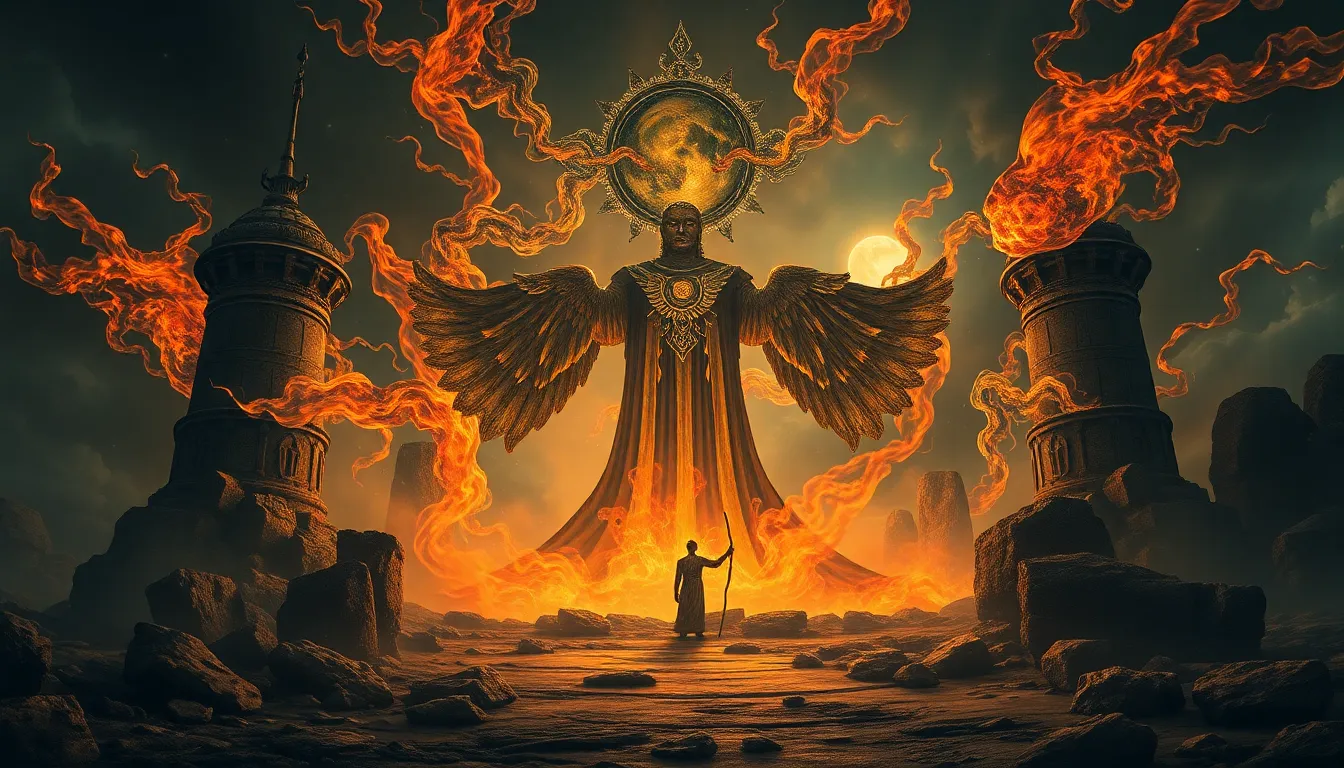The Most Bizarre Prophecies from Cultures Across the Globe
I. Introduction
Prophecy has long fascinated humanity, often serving as a bridge between the known and the unknown. Defined as a prediction or foretelling of future events, prophecies play a significant role in various cultures, reflecting their beliefs, fears, and aspirations. This article delves into some of the most bizarre and unusual prophecies from cultures across the globe, exploring how these narratives shape and are shaped by their cultural contexts.
Understanding the cultural context of prophetic narratives is crucial, as it not only highlights the diversity of human thought but also reveals the underlying values and societal norms that inform these predictions.
II. Ancient Civilizations and Their Prophecies
A. The Oracle of Delphi: Predictions of Fate and Destiny
In ancient Greece, the Oracle of Delphi held a prominent place in society, where individuals sought guidance from the Pythia, a priestess believed to channel the god Apollo. The cryptic messages delivered by the Oracle often led to significant decisions in Greek city-states.
- Fate and Free Will: Many prophecies emphasized the tension between destiny and personal choice.
- Famous Predictions: One of the most notable was the warning to King Croesus, which led to his downfall.
B. The Mayan Calendar: Misinterpretations and Prophetic Insights
The Mayan civilization is renowned for its complex calendar systems, which some interpreted as foretelling the end of the world in December 2012. However, this interpretation was largely a misunderstanding of the Mayan calendar’s cyclical nature.
Insights from Mayan prophecies often reflect themes of renewal and transformation rather than catastrophic endings.
C. Egyptian Prophecies: Gods, Pharaohs, and the Afterlife
In Ancient Egypt, prophecies were closely tied to religious beliefs, with gods playing a central role in the fate of humanity. Pharaohs were often seen as divine intermediaries, and their prophecies were believed to influence the afterlife.
- Book of the Dead: This ancient text contains spells and instructions for navigating the afterlife.
- Divine Kingship: The belief that the pharaoh’s actions could directly impact the cosmos was a powerful motivator for prophetic declarations.
III. Indigenous Prophecies and Spiritual Beliefs
A. Native American Prophecies: The Hopi and the Blue Star Kachina
Among Native American tribes, prophecies often carry deep spiritual significance. The Hopi prophecy of the Blue Star Kachina speaks of a time when a blue star will appear, signaling a period of great change.
- Environmental Awareness: This prophecy emphasizes harmony with nature and warns against ecological disruptions.
- Cultural Resilience: The Hopi people view these prophecies as a call to preserve their traditions.
B. Aboriginal Australian Prophecies: Dreamtime and Future Events
Aboriginal Australians have a rich tradition of Dreamtime stories that encapsulate their beliefs about creation and the world around them. These narratives often include prophecies about the future, reflecting the interconnectedness of all life.
C. African Tribal Prophecies: The Dogon and Sirius Star System
The Dogon people of Mali possess intricate knowledge of the Sirius star system, which they claim was imparted to them by extraterrestrial beings. Their prophecies include predictions about the cyclical nature of time and the universe.
IV. European Folklore and Prophetic Legends
A. Nostradamus: The Seer of the Future
Nostradamus, a 16th-century French astrologer, is famous for his quatrains that purportedly predict significant global events. His cryptic verses have sparked countless interpretations and debates regarding their meanings.
B. The Prophecies of Merlin: Magic, Kings, and Catastrophe
Merlin, the legendary wizard of Arthurian lore, is associated with numerous prophecies regarding the fate of Camelot and its rulers. His foresight often intertwines with themes of magic and destiny.
C. The Cailleach: Celtic Prophecies of Winter and Renewal
In Celtic mythology, the Cailleach is a hag goddess associated with winter and the cycle of life and death. Prophecies concerning her are often linked to seasonal changes and agricultural practices.
V. Asian Prophecies and Their Cultural Relevance
A. The I Ching: Ancient Chinese Divination and Predictions
The I Ching, or Book of Changes, is an ancient Chinese text used for divination. It provides insights into the flow of life and the nature of change, offering wisdom on how to navigate the future.
B. Japanese Mythology: The Prophecies of the Eight-Headed Dragon
In Japanese mythology, the tale of Yamata no Orochi, the eight-headed dragon, includes prophecies regarding the hero who would defeat it. This narrative symbolizes the triumph of good over evil and the restoration of balance.
C. Indian Epics: The Mahabharata and Predictions of War
The Mahabharata, one of the great Indian epics, is rife with prophecies, particularly surrounding the Kurukshetra War. These predictions explore themes of duty, righteousness, and the cyclical nature of history.
VI. Religious Texts and Prophetic Literature
A. The Book of Revelation: Apocalyptic Visions and End Times
The Book of Revelation in the Christian Bible is filled with vivid imagery and prophecies regarding the end of the world and the second coming of Christ. Its interpretations have sparked various eschatological movements throughout history.
B. Islamic Prophecies: The Mahdi and Signs of the Last Day
In Islamic tradition, prophecies about the Mahdi, a messianic figure, outline events leading to the Day of Judgment. These prophecies emphasize moral decay and the eventual restoration of justice.
C. Zoroastrianism: Predictions of Future Worlds and Duality
Zoroastrian prophecies speak of a final savior, Saoshyant, who will bring about the resurrection of the dead and the defeat of evil. These predictions highlight the duality of good and evil central to Zoroastrian beliefs.
VII. Modern Prophecies and Their Impact
A. The 2012 Phenomenon: Cultural Reactions and Predictions
The 2012 phenomenon, fueled by interpretations of the Mayan calendar, led to widespread speculation about an impending apocalypse. Cultural reactions ranged from panic to spiritual awakening.
B. Internet Prophecies: The Rise of Digital Seers and Influencers
In the digital age, prophecies have found a new platform. Social media influencers and online communities share predictions, leading to a modern form of prophetic discourse.
C. Climate Change Prophecies: Predictions from Environmental Activism
Modern environmental activists often invoke prophetic language to warn against climate change, calling for immediate action to avert disaster. These messages resonate with ancient themes of survival and renewal.
VIII. Skepticism and Criticism of Prophetic Claims
A. The Role of Interpretation in Prophecy
Interpretation plays a crucial role in understanding prophecies. The same prophetic text can yield vastly different meanings depending on the reader’s perspective and cultural context.
B. Historical Failures and Misinterpretations
Many prophecies have failed to materialize, leading to skepticism. Historical misinterpretations often arise from taking prophetic texts out of context or applying them to contemporary events.
C. The Psychological Aspect: Why People Believe in Prophecies
The psychological allure of prophecies lies in the human desire for certainty in an uncertain world. Belief in prophecies can provide comfort and a sense of control over the future.
IX. The Continuing Influence of Prophecies in Contemporary Culture
Despite skepticism, prophecies continue to influence contemporary culture, from literature and film to political discourse. They resonate with our collective fears and hopes, reflecting humanity’s enduring quest for understanding and meaning in the face of uncertainty.




